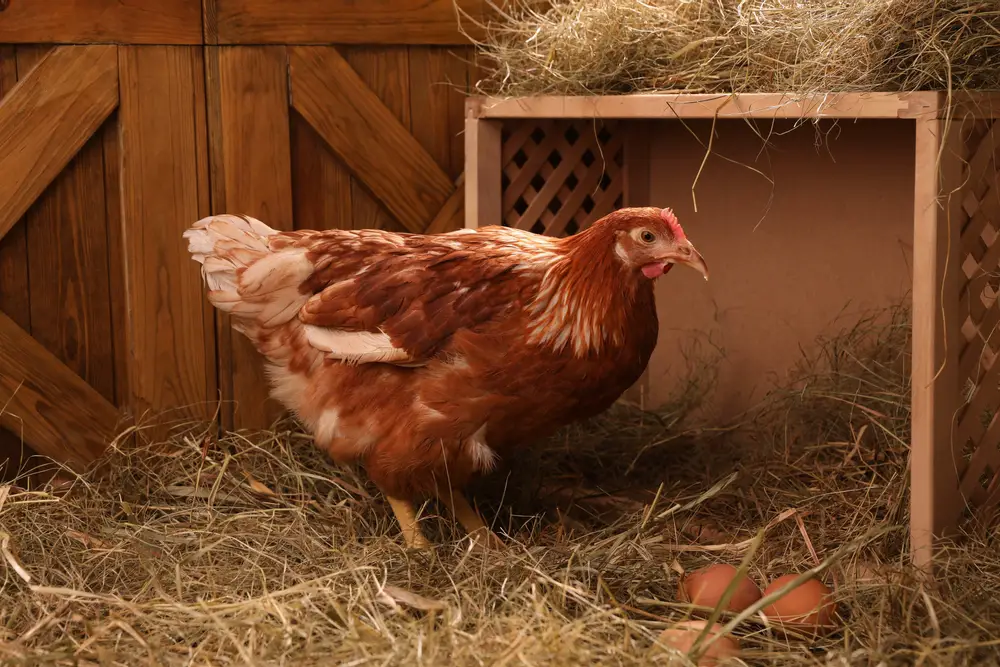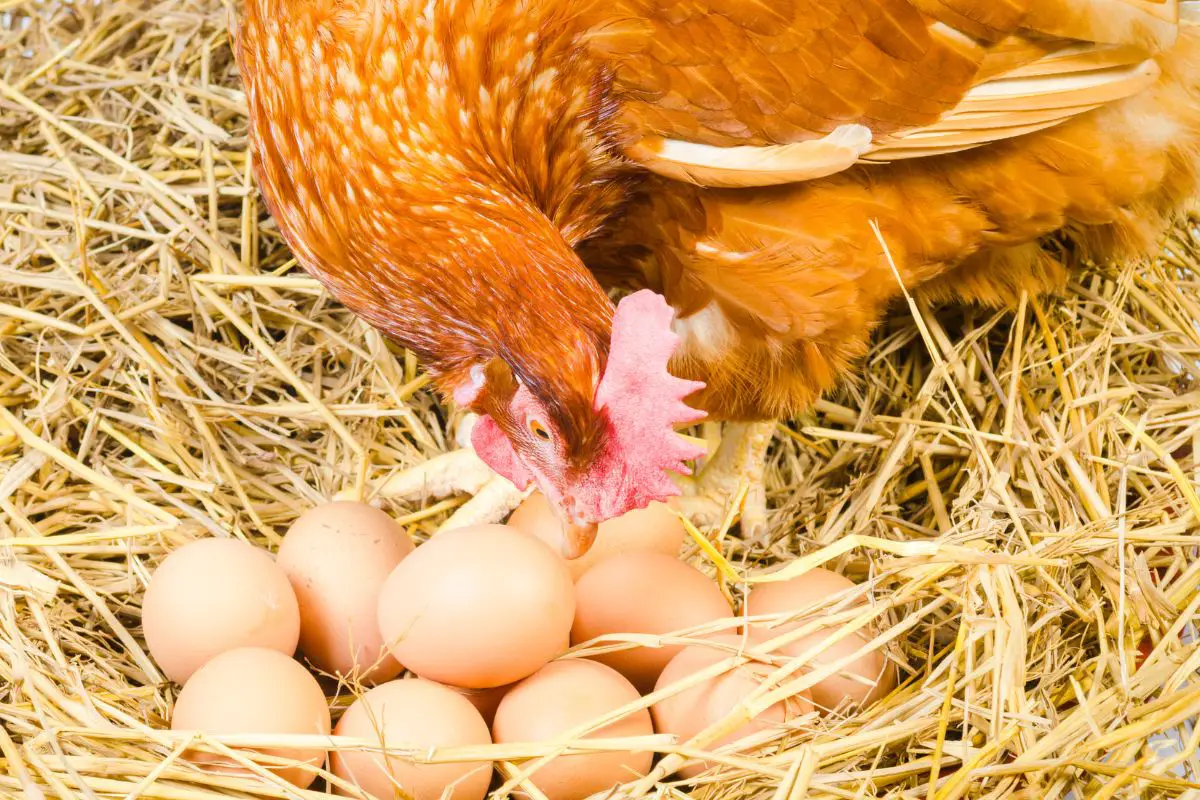You can stop a chicken from eating her own eggs by collecting eggs frequently, building a rollaway nesting box or placing fake eggs in their coops. The most common reason a chicken starts eating an egg is that it's broken - so sufficient bedding in their chicken coops is vital.
Egg eating is a serious but common problem that many chicken keepers will have to face. Because chickens can have diets that include a wide variety of foods, they aren’t picky eaters and will try just about anything that seems edible. Unfortunately, sometimes this can also include their own eggs.
In this article, we will look at the phenomenon of egg eating and what you can do to prevent your chickens from starting or continuing this nasty habit.
Table of Contents
Aim For Strong Eggshells
One of the more obvious solutions to their egg-eating habit is to make sure that the eggs don’t break. Egg breakage is one of the primary reasons why chickens will consider eating their own eggs, so preventing breakage will limit these opportunities.
Fortunately, there are plenty of things that you can do to keep egg breakage to a minimum. Feeding your egg-laying hens a healthy diet and making sure that they have a safe nesting box are two key elements to making sure eggs won’t break.
Hens should be fed primarily with a feed that is formulated for egg production. This usually means that it is high in protein and enriched with vitamins, specifically calcium. Calcium is the key ingredient in making shells sturdy and strong, so it is usually best to also give your hens some sort of calcium supplement, such as oyster shell grit.
Create a Cozy Nesting Box
Hens usually lay eggs when in a squatting position, which means that eggs can fall a few inches before they finally hit the ground. So, your eggs will be at a higher risk of breaking if your nesting boxes aren’t properly cushioned.
Each nesting box should be able to hold one hen comfortably, depending on the size of the breed. Typically this is about 10”x10”x10”, and you want to make sure you have at least one nesting box for every 3-4 chickens that you have. This will ensure that your hens won’t be overcrowding the box and won’t be prone to laying eggs outside of the nesting box.

The bottom of each nesting box should be lined with a thick layer of soft material to make sure that the eggs have a safe place to land. Organic beddings such as straw, hemp, and pine shavings will usually be the best and safest options for making sure that your eggs don’t break.
Practice Frequent Egg Collection
Collecting eggs frequently is one of the biggest factors in preventing broken eggs. Leaving eggs in the nesting box risks the chance of another egg being laid on top of it, which would likely cause one or both eggs to break.
Collecting eggs 2-3 times daily will prevent eggs from stockpiling in the nesting box. Keep in mind that most hens will finish laying their eggs by late morning, so getting out to your nesting boxes first thing in the morning is your best bet.
Build a Rollaway Nesting Box
If you don’t have the time to commit to collecting fresh eggs daily, then building a rollaway nest box might be another good solution. A sloped or rollaway nesting box will collect eggs as they are lain and allow them to safely roll away from the nesting box.
This will prevent any chance that your hen might have of pecking at the egg. Rollaway nesting boxes are usually affordable and easy to integrate into your coop, so they make for a great alternative to a traditional nesting box.
Additional Methods For Breaking The Habit
There are a variety of other tricks that you can use to help break the bad habit of egg eating. If you have a hen who has already started egg eating, then try all of the following methods:
| Fake Eggs | Placing golf balls, wooden eggs or ceramic eggs into the nesting box as decoys is surprisingly effective at stopping your chickens from egg eating. These dummy eggs that can’t be broken will often deter chickens from continuing to peck at them. |
| Flavored Eggs | Chickens will grow to love the taste of eggs, so you’ll want to change that flavor to something they aren’t fond of. Mustard and hot sauce are great options that your chickens will strongly dislike. You can take an empty egg and fill it with a combination of hot sauce and mustard. Once your egg eater breaks into it and tastes those unwelcome flavors, they will likely stop pecking at eggs altogether. |
| Boredom Busters | Always seek to keep your flock entertained and busy. Chickens who are bored and don’t have activities to engage in are more likely to start pecking at eggs. So if they have a large area of space in the yard filled with activities, treats, and roosts, they will be far less likely to take to egg eating. |
| Culling | Unfortunately if one of your hens can’t stop eating her own eggs, it might be time to consider putting her down. Culling is always a difficult decision to make, but it is sometimes necessary for the overall health and safety of your flock. |
Why Do Chickens Eat Their Eggs?
A hen will start eating her own eggs for a variety of reasons. If a hen is bored or hungry, she might peck at her eggs beneath her. Sometimes an egg will accidentally break, or the remains of a broken egg are found around the chicken coop. No matter how the egg was found, a hen will not think twice about trying to eat it.
Chickens are creatures of habit, and once they learn if something is edible, it’s likely that they will continue to eat it. If one hen is seen eating one of her eggs by the rest of the flock, they also might learn that raw eggs can be a tasty treat. This is why this is such a bad habit and should immediately be stopped when seen.
Another theory as to why hens start eating their eggs is that they are either broody or have a calcium deficiency. A broody hen might peck at her eggs to make sure that they are strong enough to hatch, and in doing so might break into one.
Hens that aren’t getting enough vitamins through their diet might recognize eggshells as a source of calcium if you’ve used crushed eggshells as a supplement previously.

